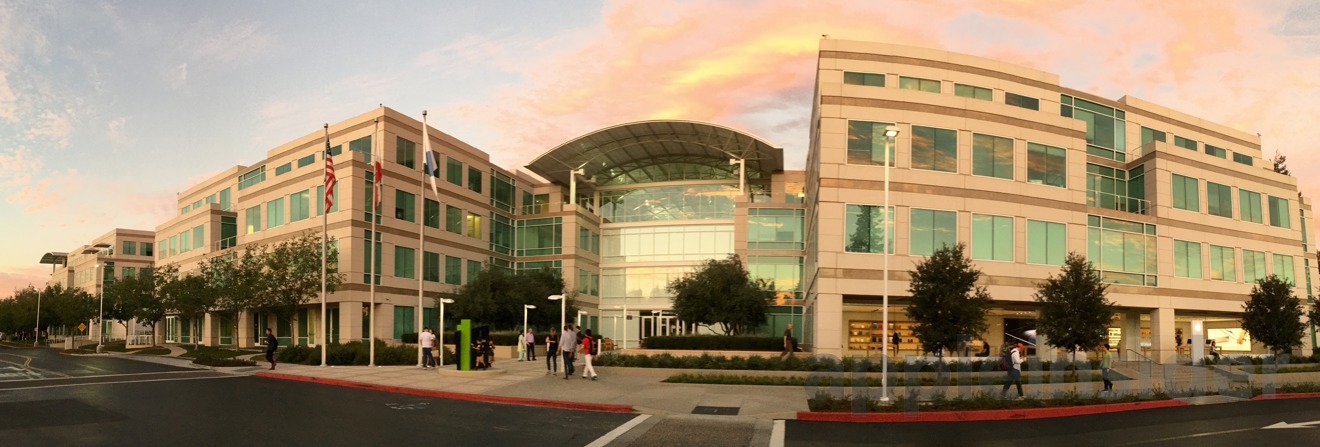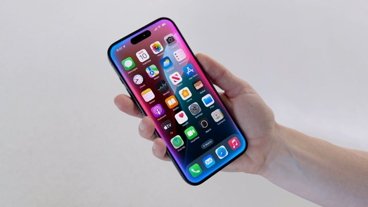Apple acquired 15 companies this year, but the identity of 6 remain a mystery
Last updated
Over the past 12 months of Apple's fiscal 2015 (ending in September), the company "completed 15 acquisitions to enhance and accelerate our roadmap for products and services," noted its chief executive Tim Cook in the company's quarterly earnings call. However, the identity of only nine of these are known, and some of those haven't been confirmed.
Apple Infinite Loop Campus
A year ago, Cook offered some mystery in addressing the companies Apple had acquired, saying of their identity, "some of which we'll try to keep quiet and some of which seems to be impossible to keep quiet."
That highlights the competitive nature involved with identifying and wooing potential companies to become part of Apple in an environment where some firms may be seeking to remain private, while others are being targeted for acquisition by other tech firms in parallel, as they also strive to expand their talent pool.
Nine of the firms Apple is believed to have acquired in fiscal 2015 include U.K. digital audio effects maker Camel Audio, U.K. media analytics startup Semetric, Virginia-based NoSQL database maker FoundationDB, multi-aperture Israeli imaging firm LinX, high-precision satellite GPS firm Coherent Navigation from California, German augmented reality firm Metaio, mapping data analytics and visualization firm Mapsense, car-focused British speech tech firm VocalIQ and machine learning partnership Perceptio located in Palo Alto.
That leaves another six companies that Apple has acquired over the past year that nobody seems to know anything about. This appears to be a significant departure from the often broadly advertised acquisitions made by many other tech companies.
Apple vs Alphabet
Apple has been on an acquisition and "acqui-hiring" binge for several years now, after long trailing the rapid acquisition pace of other Silicon Valley firms, particularly Google (now known as Alphabet). But while Apple's acquisition pace has increased, Alphabet's have slowed down.
In 2013 and 2014, the old Google had been spending well over $1 billion per year on lots of smaller acquisitions, in addition to major deals like the $2.5 billion it paid for hardware maker Nest. Over the first six months of 2015, however, it only spent $149 million on acquisitions.While Apple's acquisition pace has increased, Alphabet's have slowed down
This summer, the company's chief financial officer Ruth Porat noted she was focused on "the levers within our control to manage the pace of expenses." That reduction in spending enabled the search giant to "beat expectations" for revenue and earnings.
Alphabet's "acquisitions, net of cash acquired," over the last nine months of 2015 were $244 million, a huge drop over the corresponding months of 2014, during which it reported spending $4.6 billion. If it had continued spending so much on acquisitions this year, over the last quarter it would have erased $1 billion in profits, or effectively all of its operating income increase over the previous year ago quarter.
Apple's annual costs related to business acquisitions over the last six years has remained at around $350 to $500 million, apart from its one time splurge in buying Beats last year. That's about half as much as Google has spent historically (when you also exclude Google's largest, multi-billion acquisitions such as Nest). However, that also means Apple is now spending more than Alphabet on business acquisitions.
Acquiring Apple
In addition to acquiring other businesses, Apple is also expanding faster than Alphabet in its appetite for internal expansion. Apple's capex investments in property and equipment have been growing annually by more than 15 percent, from $8.2 billion in 2013 to 9.6 billion in 2014 and $11.25 billion in fiscal 2015. Next year, Apple expects to spend $15 billion, which would represent growth of more than 33 percent. Just five years ago, the company was only spending just over $2 billion in capex.
Across the first nine months of 2015, Alphabet spent only 5 percent more than the corresponding period of 2014 on property and equipment (around $10 billion per year), and over the last three months its capex investments actually were lower than in the year ago quarter.
Apple hired 17,400 full-time employees in fiscal 2015, an increase of 5,000 more than were hired in 2014. The world's largest public company now directly employs over 110,000 people. Apple opened 26 new retail stores in 2015, each of which employs on average a staff of 100, indicating that only about 2,600 (or 15 percent) of Apple's new employees were retail workers.
Alphabet now employs 59,976 people, an increase of 8,412 over last year. So Apple is also hiring new people at more than twice the rate of Alphabet, which includes Google and its "Other Bets," a broad range of experimental moonshots.
Apple has also "acquired" a big chunk of itself, spending $14 billion to buyback its own stock over the past quarter, expanding its total expenditures on buybacks since 2012 to an incredible $104 billion. Through March 2017, Apple has allocated another $36 billion to spend on stock buybacks. Alphabet just announced plans to spend nearly $5.1 billion on buybacks over the next two years, after years of preferring to only invest its revenues in other companies.
 Daniel Eran Dilger
Daniel Eran Dilger














 Amber Neely
Amber Neely
 Thomas Sibilly
Thomas Sibilly
 AppleInsider Staff
AppleInsider Staff
 William Gallagher
William Gallagher
 Malcolm Owen
Malcolm Owen
 Christine McKee
Christine McKee










14 Comments
I am no expert but I think that money spent in acquisitions usually has little to no impact on profits at the time of acquisition. Money spent "transforms" into asset value. The impact comes later if the acquisition increases costs of operation without an equal increase in revenue, or if the assets loose value.
Apple: We are Borg, The Black Swan Apple is the machine that Steve created to ingest technology and output innovation. Mostly, this machine evolves at a fairly conservative pace, sprinkles little bits of brilliance in every iteration, and at least a few times so far, has leapt to disrupt; an efficient market mechanism for maximizing opportunities. This machine wouldn't be possible without a strong cultural identity, nor efficiency management; it is fueled by profits of previous success, but seems to thrive with a war chest at its disposal. Yesterday, I found this link on John Gruber's site; http://ben-evans.com/benedictevans/2015/11/7/mobile-ecosystems-and-the-death-of-pcs "Things are best when they are obsolete" "The old way of doing things reaches perfection just at the time it is being replaced" It's interesting in reflection, that iOS has been such a beneficiary of these absorbed technologies and not PC's; of course it would be.
Out of those mystery 6, at least 2 are engaged in development of an AppleCar, slated to hit the road 2019-2021. It would be wise that Apple rolls out special version of that car for China only, as well as another sweet surprise for the European market. That funny BYD e6 or Renault Zoe post no significant sales results mainly beacuse of poor range accompanied by too high price, which leaves enough space for Apple to grab a larger portion of cake, with or without Tesla. So, China and Europe : prep for the AppleCar - and bow.
Apple is doomed! Alpha(male)bet is saving money by reducing new hires!!
Judging by the interface of my new 4th gen Apple TV I'm guessing Nintendo? LOL. Of course we would know is that happened wouldn't we? Anyhow I'd not, they should. Apple having exclusive rights to the Mario franchise would be amazeballs.